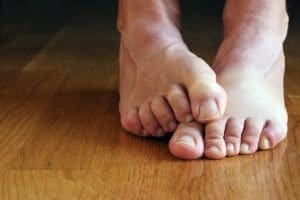
Athlete’s foot is an extremely common fungal infection. It causes dry, scaly, flaky, itchy rashes that are often located between toes and on the sides and tops of feet, although the “moccasin” form of athlete’s foot affects the heels and soles. Athlete’s foot can spread across the feet, or even to hands or toenails through contact.
The itching sensation is often the worst just after you take off your shoes and socks, though it can persist throughout the day. Other potential symptoms can include redness, inflammation, blisters, and foul odor. It is often mistaken for similar foot conditions such as eczema.
Although athlete’s foot is often treated at home using over-the-counter products, stubborn cases may need further treatment for a foot specialist. Furthermore, those with diabetes or certain circulatory conditions should seek professional treatment immediately, as athlete’s foot poses much more severe health risk in such cases.
Common Causes of Athlete’s Foot
Athlete’s foot is caused by one or more special kinds of fungi known as dermatophytes. These micro-organisms (which also cause jock itch, ringworm, and fungal toenails) feed on the keratin present in your skin, causing inflammation and rashes.
Dermatophytes thrive in dark, warm, wet environments and are highly contagious. You could get them from walking barefoot in a gym or along a pool deck, from sharing towels or linens with others, or from wearing damp socks and shoes, just to name a few examples.
Added Risks to Those with Diabetes
Although many people consider athlete’s foot no more than a temporary nuisance, it is a major health risk for people with diabetes that needs immediate attention.
If left untreated, athlete’s foot can cause deep cracks, cuts, and even bleeding of the affected skin. Because people with diabetes suffer from the effects of reduced circulation and weaker immune function, their own natural healing response may not be strong enough to fight off bacterial infections that can enter the body through these abrasions.
Even mild cases of athlete’s foot can be concerning, since an unchecked and untreated infection can spread quickly, even reaching the bone. Ultimately, dead tissue may develop, and we may be left with no choice but to amputate part or all of a foot.
We strongly recommend that anyone with diabetes who develops symptoms of athlete’s foot schedule an appointment with us right away. The potential consequences are too severe to leave this matter to chance.
Treatment for Athlete’s Foot
For those who do not have diabetes and are otherwise relatively healthy, athlete’s foot can usually be treated at home using over-the-counter antifungal products, such as creams, powders, and sprays. It’s important to follow the directions on the product to the letter and complete the full treatment course, even if symptoms seem to clear up earlier. This is to ensure that the fungus is truly eradicated and less likely to return.
If you do have diabetes, or your athlete’s foot isn’t responding to home care (or keeps returning), schedule an appointment with Foot & Ankle Clinic of the Virginias. Our team of foot specialists will determine whether a fungal infection is truly the cause of the problem and devise an appropriate treatment plan. You may require stronger antifungal medications (including oral pills), or possibly an antibiotic if there is a bacterial infection.
Prevention Tips
In order to avoid contracting athlete’s foot in the first place—or preventing it from returning—it’s a good idea to practice these prevention tips:
- Practice good hygiene, washing feet every day.
- Keep feet dry, letting them air out at home whenever possible.
- Never go barefoot in public, especially moist environments like pool decks.
- Change socks and shoes as often as needed so they don’t get damp and sweaty. Rotate shoes so they get at least a day to air out between uses.
- Treat your feet and shoes every day with antifungal powder.
- Avoid sharing towels, socks, shoes, or linens with others who are infected.
If you need professional care for your athlete’s foot, please call Foot & Ankle Clinic of the Virginias at (800) 456-8637. We have many convenient locations to serve you. You can also request an appointment online.

